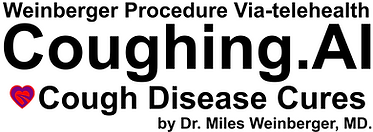Pathways That Lead to Development of Chronic Cough ~ Cures
- Dennis Buettner
- Nov 28, 2022
- 3 min read
Updated: Aug 5, 2023
We are including this correspondence; as we do for others; to, and from Dr. Miles Weinberger, MD.
Dr. Weinberger is INDEED a medical "star" in worldwide lay media; when it comes to curing what many refer to as their "daytime, horror cough!"
No matter what ANYBODY says; this is NOT science fiction. Dr. Weinberger's cure is a peer reviewed and published medical fact. He has countless reports of instant and permanent cures in children and adults ~ including post-COVID cough, and long-COVID cough!
Dr. Weinberger's chronic cough curative success is noted in numerous stories of instant, and permanent cures (not just treatment with no potential for positive outcome) in children and adults all around the world.
We feel compelled to replicate his correspondence when we know that the questioning, and answers would be the same no matter who reaches out to Dr. Weinberger in the depths of despair after weeks, months, years; and EVEN decades of mystery horror cough.
95% of Dr. Weinberger's patients are instantly and permanently cured; in-office, via-telemedicine, and simply by watching a fun YouTube documentary, and following simple instructions that 4 year-olds understand.
We firmly believe that his curative rate will dramatically improve with more post cure recovery assistance.
The head of pediatric pulmonology at Johns Hopkins Pediatric Pulmonology reports an above 99.9% cure, and recovery rate. - Editor
Read THIS, and learn about so many Refractory Unexplained Chronic Cough (RUCC) cures. Most important part of Dr. Weinberger's diagnosis: "... cough absent once asleep; (even thought it is difficult to get to sleep due to your cough) only to have your "horror cough" return once awake." HERE
Dr. Weinberger, Very interesting report HERE. I suspect that there are multiple pathways that lead to development of chronic cough. Some may involve peripheral nervous remodeling (as my group and others have shown) while others involve central nervous remodeling. Psychogenic or habit cough may either be related to the latter or a distinct form of chronic cough resulting from unique central nervous mechanisms. Some of our most consistent therapy for unexplained chronic cough is speech therapy, in which biofeedback seems to play a prominent role in enhancing voluntary cough suppression. It seems likely that this series of patients may similarly enhance voluntary suppression. Is that how you are conceptualizing these outcomes?
Best
Dr. D

From Dr. Weinberger to Dr. D.: Dr. D, Thank you for your comments about chronic cough. I agree that there are certainly multiple pathways to chronic cough. Response to speech and language therapy as treatment has been documented but a 2019 Cochrane Library on the subject suggested limited duration of benefit. My concept of the outcome from suggestion therapy is influenced by the responses of patients, who are often quite intelligent and insightful.
The following video was the first time I provided suggestion therapy remotely by teleconference in the same manner that I and my colleagues had done with direct contact in a pediatric pulmonary clinic for 40 years. The girl's father placed the video on YouTube and on his own web site. https://youtu.be/jnQUvD8Qdj0 this is the full version of the video on YouTube that over 100 children and 24 adults have reported to us over the past few years that watching the video enabled them to stop coughing. Follow-up after many months has thus far indicated that coughing once stopped generally stays stopped. - Dr. Miles Weinberger, MD.
One comment I've heard from several adults of various ages who viewed the video was, "if a 12 y.o. girl can stop coughing, then I can too." I've since talked with most of the adults and have insights based on those discussions. One adult chose to describe her experience on her weekly web site blog: https://youtu.be/iJqTmeb2NrU I agree with your thought that watching the video, which I called suggestion therapy by proxy, enhances voluntary suppression. They become convinced that the cough can be suppressed, and they then suppress the cough. And patients have indicated that once they suppress the cough influenced by the video, they know how to do it again on their own if the cough returns. I would love to discuss this further with you. As I previously indicated in my publication, I agree with the suggestion in your article that the increased nerve density you described was a function of the repeated coughing, and the patients appear to perceive that. Of course, that doesn't explain why it starts in some but not in most; that's the missing link. Dr. Miles Weinberger, MD.





Comments